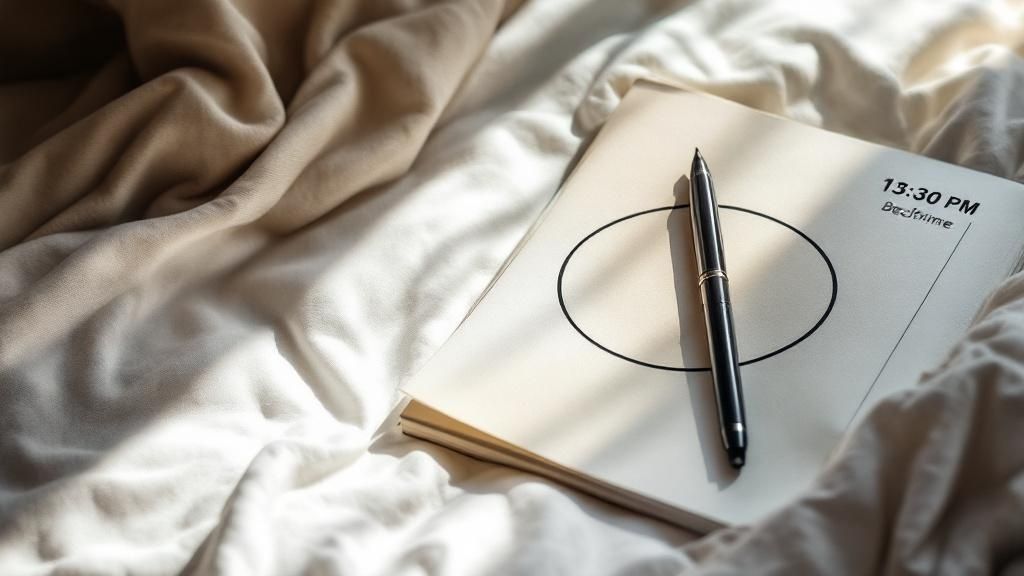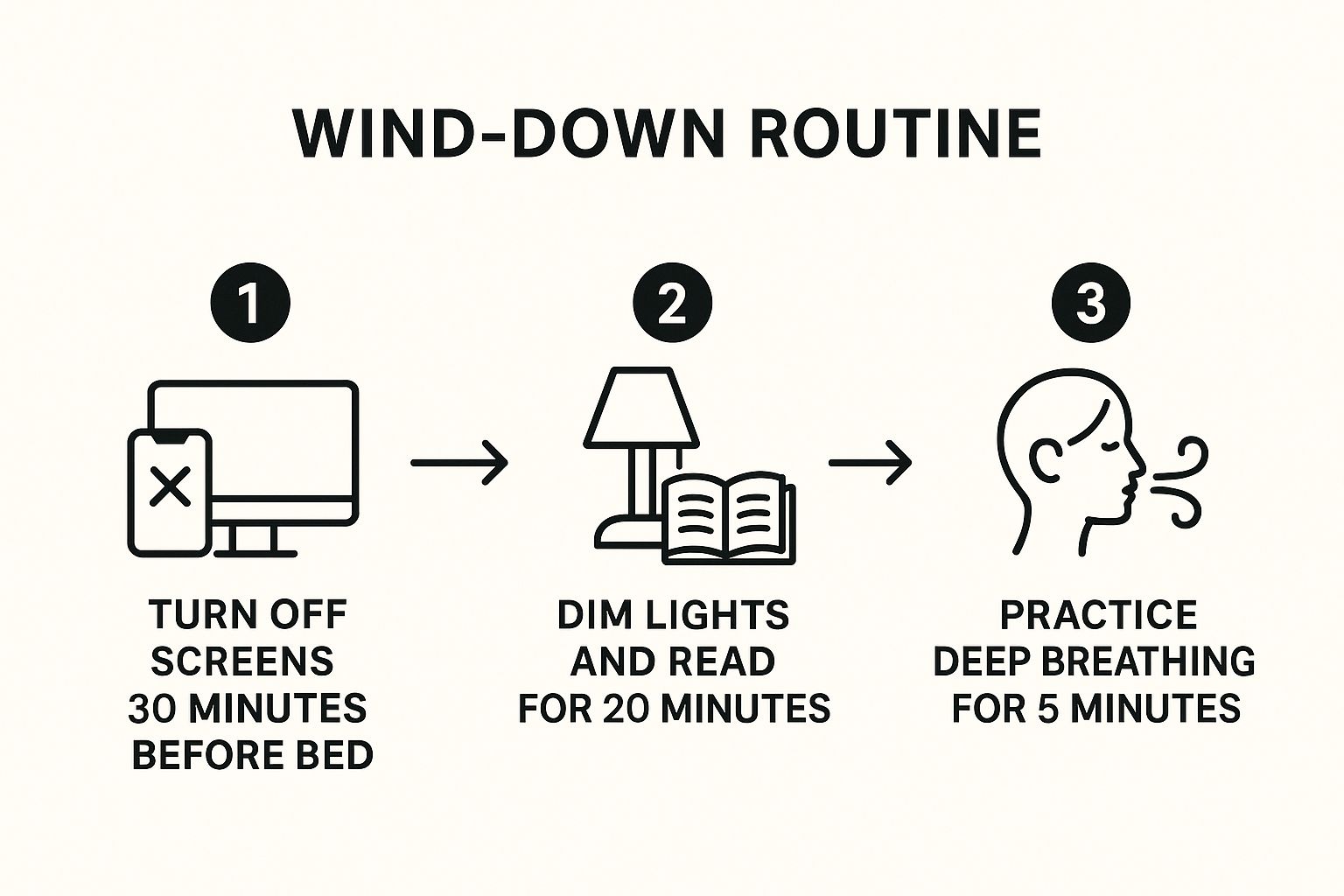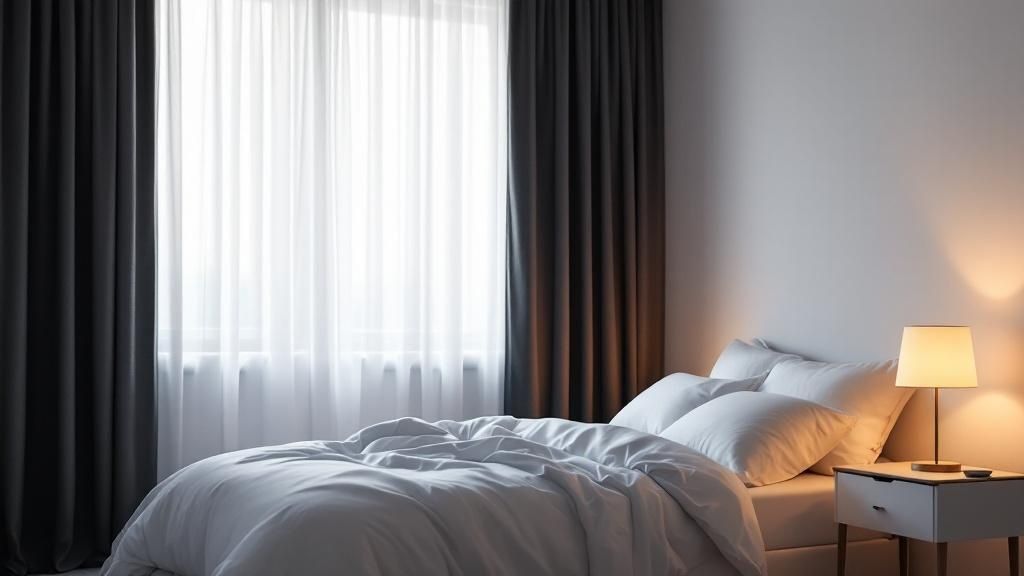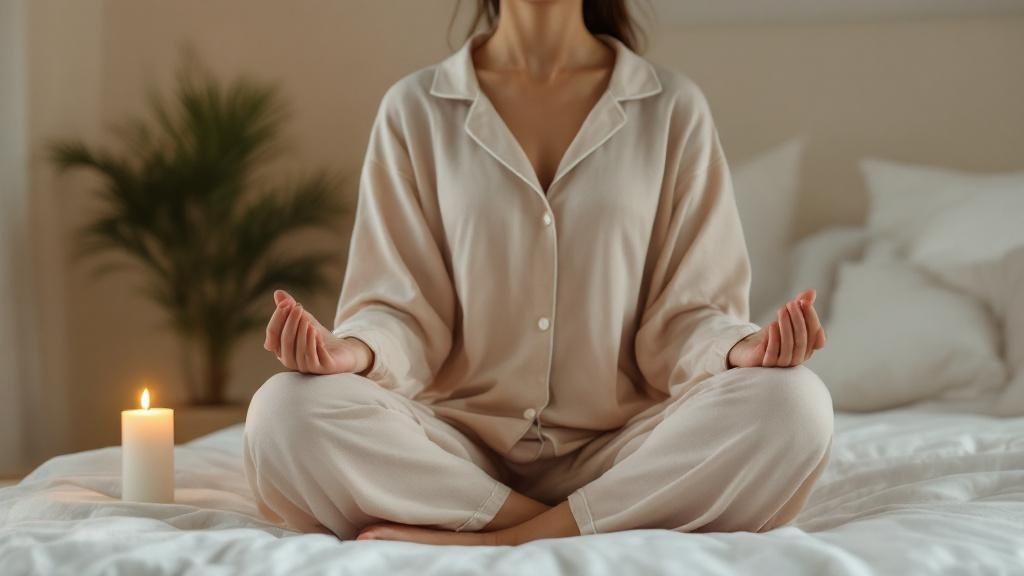If you find yourself staring at the ceiling long after you’ve turned out the lights, you're definitely not alone. The trick to falling asleep faster isn't some complicated secret; it's about giving your brain and body clear signals that it's time to power down for the night. This means taking control of your environment, quieting your mind, and figuring out what’s really keeping you awake.
Why So Many People Can't Fall Asleep Quickly
Tossing and turning is an incredibly common frustration. For millions of us, the quiet of the night is anything but peaceful—it’s filled with racing thoughts about work deadlines, family duties, or financial stress. This isn't a personal failure; it’s a symptom of our "always-on" world, where truly switching off feels almost impossible.
It’s a global issue. According to ResMed's 2025 Global Sleep Survey, nearly one-third of people struggle to fall or stay asleep multiple times a week. The main culprits are probably familiar:
- Stress (57%)
- Anxiety (46%)
- Financial worries (31%)
The pressure to be constantly connected and productive keeps us in a state of low-grade, persistent alertness. Your brain can't find the "off" switch when your phone is still buzzing and your mind is stuck replaying the day’s events.
The Modern Pressures Affecting Your Sleep
This non-stop mental churn leads to a few key problems that actively work against sleep.
First, there's performance anxiety. Have you ever worried about not getting enough rest, which then, ironically, keeps you awake even longer? That's your brain working against itself.
Then there's mental clutter. An unquiet mind, bogged down by tomorrow’s to-do list or yesterday’s regrets, simply can’t achieve the relaxation needed to drift off.
Finally, you have hormonal disruption. Chronic stress can throw your cortisol and melatonin levels out of whack—the very hormones that manage your sleep-wake cycle. For some, underlying hormonal imbalances are a big piece of the puzzle, and it can be helpful to explore natural ways to support hormone balance.
"Accepting poor sleep as 'normal' is a dangerous trend. Quality rest isn’t a luxury—it’s the foundation for your mood, focus, and overall health."
Just understanding that these modern pressures directly impact your ability to rest is a huge first step. Once you see the connection, you can start building a routine that pushes back. For a deeper look at this, our guide on https://bamtekhome.com/blogs/sleep-and-your-health is a great place to start.
Crafting the Perfect Environment for Sleep

Your bedroom should be a sanctuary for rest, not a multi-purpose room where work, entertainment, and sleep all fight for attention. To fall asleep faster, your brain needs clear, consistent signals that it’s time to wind down. Creating this dedicated sleep environment is one of the most powerful changes you can make.
Think of your bedroom as a cave: it should be cool, dark, and quiet. A cooler room is essential, as your body's core temperature naturally drops to initiate rest. I always recommend setting the thermostat between 60 and 67°F (15-19°C). This simple adjustment does wonders for helping your internal clock regulate itself.
This focus on environment is more critical than ever. According to the 2025 IKEA Sleep Report, the average person is getting 1 hour and 20 minutes less sleep than they need each night. That gap widens to over two hours in some countries, like Turkey, showing a widespread need for better sleep habits.
Control Light and Sound
Even tiny amounts of light can disrupt melatonin production. I’m talking about the glow from streetlights, alarm clocks, and even small charging indicators. All of this light pollution can quietly sabotage your rest.
Investing in a good set of blackout curtains is a fantastic solution, especially if you live in a city. For unpredictable noises—like traffic or that neighbor who suddenly decides to vacuum at 10 PM—a white noise machine or a simple fan creates a consistent, soothing soundscape that masks disturbances. Playing with various bedroom lighting ideas for the evening can also dramatically improve your ability to unwind before bed.
A clutter-free space supports a clutter-free mind. By reserving your bed for sleep and intimacy only, you build a powerful psychological association that tells your brain it’s time to shut down the moment your head hits the pillow.
Finally, make sure your bedding is working with you, not against you. Temperature-regulating fabrics are a game-changer. Our guide on https://bamtekhome.com/blogs/bamboo-sheets-benefits-your-complete-guide-to-better-sleep breaks down how the right material can keep you comfortable all night long.
How to Quiet a Racing Mind Before Sleep
Is there anything more frustrating than finally getting into bed, only to have your brain switch into overdrive? It's a classic problem: the moment your head hits the pillow, your mind starts racing with to-do lists, worries, and random thoughts. This mental chatter keeps your body in a state of high alert, making it feel impossible to relax and drift off.
The trick is to have a few go-to techniques to intentionally calm your nervous system and break that cycle of anxious thinking.
And it’s not just you. Sleep anxiety has become a major issue, especially for younger generations. In fact, some studies show that nearly 40% of Gen Z adults struggle with it at least three times a week, a side effect of our always-on, hyper-connected world. It's a growing wellness concern that’s getting more attention.
This simple routine can help signal to your brain that it's time to wind down.

Having a structured approach like this really does help your mind and body shift gears from "go" to "slow," making sleep feel much more natural.
Guided Relaxation Methods You Can Actually Use
One of my favorite, and most effective, strategies is the 4-7-8 breathing method. Think of it as a natural tranquilizer for your nervous system. It’s incredibly simple and you can do it right in bed.
- First, inhale quietly through your nose for a count of 4.
- Then, hold your breath for a steady count of 7.
- Finally, exhale completely through your mouth for a count of 8, making a gentle "whoosh" sound.
Just repeat this cycle three or four times. The focus on counting and the long exhalation physically slows your heart rate and gives your brain something to do besides worry.
Another powerful tool is progressive muscle relaxation. It sounds complicated, but it's not. You start with your toes, tensing those muscles for just a few seconds, and then consciously releasing all the tension. You slowly work your way up your body—calves, thighs, stomach, arms, all the way to your face. This practice is fantastic for making you aware of where you're holding physical stress so you can actively let it go.
Try a "Brain Dump" in a Journal
I've found that keeping a simple notebook by my bed is a game-changer. Before you turn out the lights, take just five minutes to write down whatever is swirling around in your head. It could be your to-do list for tomorrow, a nagging worry, or just random ideas. Getting these thoughts out of your head and onto paper helps clear your mental slate so they don’t keep you up. Another fantastic practice to add to your toolkit is meditation for anxiety, which is specifically designed to calm these kinds of intrusive thoughts.
How to Build a Sleep-Friendly Daily Routine

The secret to falling asleep faster doesn't start when you climb into bed. It actually begins the moment you wake up. Your daily habits are constantly sending signals to your brain, either preparing it for a great night's sleep or setting you up for a struggle. The goal is to build a daily rhythm that works with your body, not against it.
Let's start with the most powerful habit: a consistent wake-up time. I know, it's tempting to sleep in on Saturdays, but that can throw your internal clock for a loop. Waking up at the same time every single day—weekends included—anchors your body’s natural sleep-wake cycle. Over time, your body learns to anticipate your schedule, making it much easier to feel sleepy when it's actually time for bed.
What you put into your body matters, too. That afternoon coffee is a common culprit. Caffeine can linger in your system for a surprisingly long time, so it's a good rule of thumb to cut it off at least eight hours before you plan to sleep. A 3 PM latte can easily keep you wired and restless at 11 PM.
Timing Your Light Exposure and Exercise
Getting outside for 15-20 minutes of morning sunlight is one of the best things you can do for your sleep. That early blast of natural light tells your brain to stop producing the sleep hormone melatonin, effectively kickstarting your day and setting a timer for its return in the evening.
Exercise is another fantastic tool, but you have to be smart about the timing. A tough workout cranks up your core body temperature and heart rate, which is the exact opposite of what your body needs to wind down for sleep.
Here’s how to time it right:
- Intense Workouts: Schedule these for the morning or early afternoon. This gives your body plenty of time to return to a calm, restful state.
- Gentle Activity: A light walk or some evening yoga can be perfect. These activities help release physical tension without overstimulating your system.
Think of your day as a series of signals you're sending to your brain. Consistent wake times, morning light, and well-timed exercise all communicate a clear message, preparing you for a restful night.
And finally, a word on alcohol. A nightcap might make you feel drowsy at first, but it's a bit of a trick. Alcohol actually disrupts the quality of your sleep later in the night, especially the restorative REM stage. This is why you might find yourself wide awake at 3 AM after a few drinks. Limiting alcohol in the hours before bed is key for truly uninterrupted rest.
The Smart Way to Handle Sleepless Nights

We’ve all been there. You're lying in bed, staring at the ceiling, and every passing minute makes you more frustrated. You know you need to sleep, but your brain just won't switch off.
Tossing and turning like this is more than just annoying; it actually teaches your brain to associate your bed with anxiety and wakefulness. The longer you lie there stressing, the stronger that negative connection becomes. But there's a surprisingly effective way to break the cycle.
If you’re still wide awake after about 20 minutes, it's time to get out of bed. I know it sounds counterintuitive, but this is one of the most powerful techniques in Cognitive Behavioral Therapy for Insomnia (CBT-I).
Hitting the Mental Reset Button
The idea isn’t to give up on sleep for the night. Instead, you're giving your mind a chance to reset. Go to another room, keep the lights low, and do something quiet and calming. The goal is to find an activity that’s relaxing but not so engaging that it wakes you up completely.
Some great options I've found work well are:
- Reading a real, physical book (screens are too stimulating).
- Listening to some soft, ambient music or even a purposefully dull podcast.
- Doing a few gentle stretches to release physical tension.
- Working on a simple jigsaw puzzle.
The point of this exercise is simple but profound: you're retraining your brain. You’re breaking the link between your bed and the frustration of not sleeping, and re-establishing it as a place meant only for rest.
Once you start to feel genuinely sleepy again—not just bored—that's your cue to head back to bed. This simple strategy can dismantle sleep anxiety and help you reclaim your nights.
For a deeper dive, check out our guide on other https://bamtekhome.com/blogs/strategies-for-a-restful-nights-sleep. By actively managing these moments of sleeplessness, you take back control from insomnia.
Answering Your Questions About Falling Asleep
https://www.youtube.com/embed/5SVPuTBAR9Q
Even when you're trying your best to build better sleep habits, specific questions always seem to come up. When you’re staring at the ceiling at 2 AM, it’s easy to get lost in the details. Let's clear up some of the most common things people ask when trying to get to sleep faster.
Can Certain Foods Really Help Me Fall Asleep?
Absolutely. What you eat in the evening can genuinely signal to your body that it's time to wind down. It's not just an old wives' tale; some foods contain nutrients that actively promote rest.
You’ll want to look for foods rich in things like tryptophan, magnesium, and melatonin. Some of my go-to recommendations include:
- Turkey: It’s famous for its tryptophan, an amino acid that helps your body produce serotonin and then melatonin.
- Nuts: Almonds and walnuts are packed with magnesium, a mineral known for its ability to help calm the nervous system.
- Tart Cherries: This is one of the few natural food sources of melatonin, the hormone that governs your sleep-wake cycle.
- Kiwi: Research has pointed to its mix of antioxidants and serotonin, which can help people fall asleep quicker and stay asleep longer.
A small, carb-heavy snack about an hour before bed can also give tryptophan a helping hand in reaching your brain. Just be careful to avoid big, spicy, or fatty meals right before you lie down—they’re a classic recipe for indigestion and a restless night.
I Use a Blue Light Filter on My Phone. Is That Good Enough?
A blue light filter is definitely a step in the right direction, but it doesn't solve the whole problem. The real sleep-killer is often the content on your phone. Scrolling through social media, checking stressful work emails, or reading the news keeps your brain fired up and engaged.
Think of it this way: the very act of tapping, scrolling, and reading puts your mind in an active, problem-solving mode. To truly prepare for rest, your brain needs a clear signal that the day is over. That's why I always advise setting a firm "digital curfew" at least 60 to 90 minutes before you want to be asleep.
Your brain needs a buffer zone to transition from the constant stimulation of the day to the quiet calm needed for sleep. Swapping your phone for a physical book or some quiet music is a much more powerful way to get ready for a good night's rest.
How Long Should I Try These Tips Before Seeing a Doctor?
Give yourself a solid three to four weeks of consistent effort. It takes time for your body to adjust and for new habits to stick. Resetting your internal clock doesn't happen overnight.
If you’ve been diligent for a month and you're still struggling to fall asleep—or if your lack of sleep is seriously affecting your mood, work, and health—it’s time to talk to a healthcare professional. They can look for underlying issues like sleep apnea or restless legs syndrome and discuss other treatment options if your own efforts aren't enough.
Ready for a truly restorative night's sleep? The right bedding makes all the difference. Discover the breathable, thermoregulating comfort of Bamtek's 100% organic bamboo sheets and transform your bed into a sleep sanctuary. Explore the collection at Bamtek Home.










